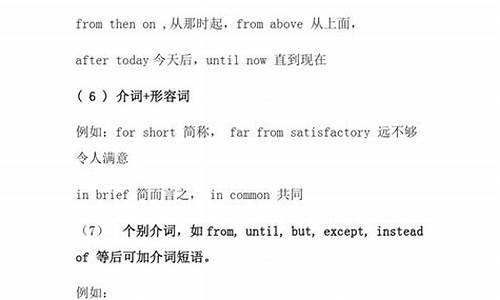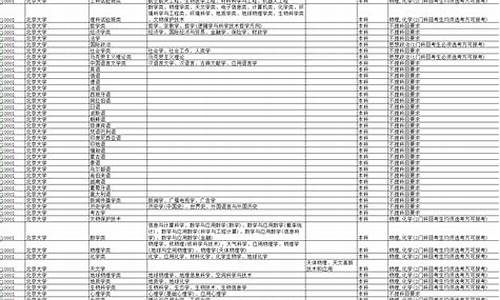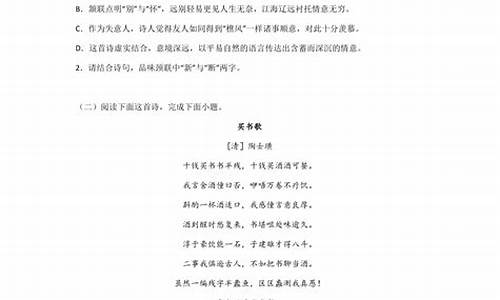您现在的位置是: 首页 > 教育研究 教育研究
介词高考语法,介词高考考点
tamoadmin 2024-05-18 人已围观
简介介词英语语法-介词 介词的定义和特征 介词是一种用来表示词与词, 词与句之间的关系的词。在句中不能单独作句字成分。介词后面一般有名词代词或相当于名词的其他词类,短语或从句作它的宾语。介词和它的宾语构成介词词组,在句中作主语, 状语,表语,补语或介词宾语。例如: Most of the students went to the classroom. 大部分学生去了教室。 We play baske

介词
英语语法-介词
介词的定义和特征
介词是一种用来表示词与词, 词与句之间的关系的词。在句中不能单独作句字成分。介词后面一般有名词代词或相当于名词的其他词类,短语或从句作它的宾语。介词和它的宾语构成介词词组,在句中作主语, 状语,表语,补语或介词宾语。例如:
Most of the students went to the classroom.
大部分学生去了教室。
We play basketball on the sports ground.
我们在操场上打蓝球。
介词常与动词,形容词,名词一起构成固定搭配。
belong to 属于 rely on 依靠
talk to 同...谈话 be afraid of 害怕
be strict with对...严格
介词一般放在名词之前。但它后面的介词宾语是疑问代词,疑问副词或者关系代词时,这些词提到了前面而只剩下介词在后了。
Where do you come from?
你是哪儿人?
Who are you talking to?
你在跟谁谈话呢?
What do you study for?
你为了什么而学习?
介词在英语词汇中所占比例很小,但它们的用法却非常灵活,复杂。下列为常用介词及含义:
about 关于,附近,大约,周围,随身.
I have bought a book about Shakespearean.
我买了一本有关莎士比亚的书。
There are about fifteen trees in the picture.
里大约有十五棵树。
above 在....上,高出,以上,超过,在...上游.
The plane is flying above the clouds.
飞机在云上飞行。
I think the man is above sixty years old.
我想那人有六十多岁了。
across 横过,对面,交叉,在...的对面.
Can you swim across the river?
你能游过河吗?
We live across the street.
我们住在街的对面。
after 在...后面,依照.
He went home after school.
他放学后就回家了。
Read after me, please.
请跟我朗读。
against 撞到,靠着,反对,违背,
The car hit against the tree.
汽车撞了树。
He is standing against the wall.
他靠墙站着。
along 沿着,顺着.
They are walking along the river.
他们沿着河行走。
among 在...当中.
He is the tallest among them.
他是他们当中个子最高的。
around 在...的周围,在...那一边.
They sat around the table talking the news.
他们绕桌而坐谈论新闻。
There is a drugstore around the corner.
拐角处有一家药店。
as 作为.
He doesn't like people treat him as a child.
他不喜欢人们把他当小孩子对待。
at 在...时刻,在...点钟,在...岁时, 向,在...之中,按...速度,值(卖)...钱,
He always gets up at six in the morning.
他时常早上六点钟起床。
He shot at the bird but missed it.
他向鸟射击,但是没射中。
The car goes at eighty miles an hour.
汽车以每小时八十公里的速度行驶。
before 在...的前面(位置),在...之前(时间)
He took a picture before the car.
他在汽车前照了张照片。
He can't finish his work before supper.
晚饭前他完不成工作。
behind 在...的后面(位置), 落后于,不如,
迟于,晚于(时间)
Are there any brooms behind the door.
门后有扫帚吗?
All of us are behind him in mathematics.
我们数学都不如他。
below 在...之下,低于,
There are four lights below the ceiling.
天花板下面有四盏灯。
The murderer run away below the police's eyes.
杀人犯从警察眼皮底下跑了。
beside 在...的旁边,在...之外,与...相比.
He found the body by the river.
他在河边发现了尸体。
Beside yours, my computer is too slow.
与你的计算机速度相比,我的就慢多了。
besides 除...之外,
We are all here besides Bowe.
除鲍外,我们也都来了。
between 在...两者之间,
The relations between the two countries has improved since then.
两国的关系从那以后得到了改善。
beyond 在...那边,
The shop you are looking for is beyond the street, you can't miss it.
你要找的商店在街的那边,你不会找不到的。
but 除去.
He has nothing but money.
他除钱以外什么都没有。
by 被..., 在...的近旁 , 在...之前, 不迟于, 以...为手段。
The classroom was cleaned by the students.
教室由学生们打扫干净了。
Miss Lucy came to China by air.
露西**是乘飞机来中国的。
down 沿着...望下。
She walked down the street.
她沿着街道走。
during 在...期间,在...时候。
During the holiday, we went to the south.
我们假期去了南方。
except 除...之外。
He knows nothing except English.
他除英语以外什么都不知道。
for 为..., 因为..., 至于... 。
He works for this company.
他为这家公司工作。
She came back to the classroom for she had left her books in the classroom.
她返回到教室是因为把书留在了那里。
from 从..., 来自..., 因为...。
Where are you from?
你是哪里人?
He died from an accident.
他死于一场事故。
in 在..., 在...之内,从事于..., 按照..., 穿着...。
He was born in 1992.
他生于1992年。
I could finish the program in two weeks.
我可以用两周时间完成这个项目。
He spend less time in reading.
他读书时间很少。
The man in black jacket is our teacher.
穿黑夹克的那个人是我们的老师。
like 象...,如同...。
The twins are like their father.
双胞胎象他们的父亲。
near 靠近....。
There are some flowers near the house.
房子附近有一些花。
of ...的,属于...。
This is a map of China.
这是一张中国地图。
off 离开...,在...之外。
The young man got off the train quickly.
那个年青人很快下了火车。
I live in a village a little way off the main road.
我住在离大路不远的一个村庄里。
on 在...之上。
My book is on the table.
我的书在桌子上。
out of 从...出来,在...之外。
The dog run out of the house.
狗从房子里跑出来。
outside ... 外边.
They are waiting outside the gate.
他们在门外等着。
over 在...之上,遍于...之上,越过...。
There is a light over the desk.
桌子上方有盏灯。
He is over sixty years old.
他有六十多岁。
past 越过...,过...,超越...。
The students walked past the post office.
学生们走过了邮局。
It is ten past two.
现在是两点十分。
round 围着...,绕过...,在...周围。
We sat round the table.
我们围着桌子坐下。
The earth goes round the sun.
地球绕着太阳转。
since 自... 以后,自...以来。
He has made great progress in English since he came into the college.
从他来到大学后,他的英语有了很大进步。
through 经过...,穿过...。
They went through the forest.
他们穿过了森林。
throughout 遍及...,在各处。
The police searched for the criminal throughout the mountain.
警察搜山寻找犯人。
till 直到...,在...以前。
He didn't come back till eleven o'clock.
他直到十一点钟才回来。
We'll be home till six.
六点以前我们都会在家。
to 到...,向...,趋于。
How long is it from here to the station?
从这儿到车站有多远?
under 在...之下,低于。
There are some footballs under the bed.
床底下有几颗足球。
These students are under seventeen years old.
这些学生们不到十七岁。
until 直到,在...以前,
Please wait for us until we come back.
请等着我们回来。
It was not until last week that I handed in mathematics paper.
直到上周,我才交了数学论文。
up 在...上面,在...上。
He went up the stairs.
他上了楼梯。
upon 在...之上,迫近...。
It's not polite to look down upon him.
蔑视他是不礼貌的。
within 在...之内。
You must finish the work within two weeks.
你必须两周内完成这项工作。
without 没有,不,在...之外。
We can't do it better without your help.
没有你的帮助,我们就做不好。
We couldn't live without air and water.
没有空气和水,我们就不可能生存。
高中英语关于介词在句中的作用知识点
1介词的搭配与选择
介词不能在句子中独立充当一个成分,而需要与其后面的宾语相结合,成为介词短语,在句中充当一个成分。所以选用什么介词要根据其后面所接的宾语而定。但是,有时介词也受其前面用词的限制,因此,许多情况下也应根据介词前面的词选用相应的介词。
高三网我为大家整理整理了高中语数外、政史地、物化生九科知识点,各科知识点都包含了知识专题、学习方法、解题技巧等内容。更多2016年高考各科复习知识点请查看<<<高中总站>>>,高考知识点频道有你想要的珍贵复习资料。欢迎访问高三网,高考生的专属网站。
2介词的语法功能
介词与其他词类或成分结合后方能在句子中充当语法成分,构成介词短语。介词短语可以作定语(须后置)、状语、表语、宾语补足语、另一个介词的宾语,间或作主语等。
例如:
The skyscraper in the distance isa five-star hotel.(定语)
Her eyes were tired from long reading.(状语)
The decision is of great importance to me.(表语)
They found the machine in a bad state.(宾语补足语)
A pretty girl appeared from behind the curtain.(介词宾语)
On purpose or not on purpose is of great difference.(主语)
3介词的分类
介词是用于名词词组或相当于名词词组的结构之前,表示词语之间意义关系的词类。 英语常用的介词大致可分为四类:
1.简单介词
顾名思义,简单介词是指由一个单词构成的介词,也是使用最频繁的一类介词。简单介词也可能由形容词、副词、分词、名词、连词等转变而来。常用的简单介词有:
at,about,above,across,after,among, against,before,behind,below,beside,between,beyond,but,despite,during,except,for,in,of,on,over,near,past, round,since,through,till,until,with,up等。
2.合成介词
指由介词+其它介词或副词构成的介词。常用的合成介词有:
inside,into,onto, outside,throughout,towards,within,without等。
3.二重介词
指由两个单一的介词并列在一起,作为一个介词使用并表达一个完整意思的介词。常见的二重介词有:
from among,from behind,from under,until /till after等。
4.短语介词
指由介词+介词、介词+名词、介词+分词、介词+动词、介词+形容词、介词+副词等构成的短语.常用的有:
according to, along with,in front of,by means of,in spite of,together with,with regard to等。短语介词与介词短语不同。介词短语是由介词加宾语构成,本身可作句子成分,如定语或状语等,可单独使用;而短语介词是用作介词的短语,不可独立使用,本身不能作句子成分,后面要跟名词、动名词或代词等。
4介词的宾语
介词的宾语可以是名词、代词或其他词类或句子等。例如:
名词:The car ran into a wall,and two men were killed.
代词:Wherever he went,he carried the photo with him.
形容词:Your plan is far from perfect.
副词:I can't see the tower clearly from here.She came from afar.
动名词:He entered the room without taking off his hat.
不定式:He did nothing but cry.
介词短语:She often studies till after midnight.
数词:In nine out often he won't come.
疑问词+不定式:The problem of how to get enough money is difficult to settle.
疑问词引导从句:He does not care about who will be promoted.
that引导的从句:Man differs from other animals in that man can laugh and speak.
5介词短语的句法功能
1.作定语
The key to the door is missing.
2.作表语
As we know, Japanis to the east of China.
3.作状语
1) On Sundays, the family are mostly out. (时间状语)
2) On top of the hill stands a TV tower. (地点状语)
3)All the work must be done by hand. (方式状语)
6介词的复合结构
1. 介词+宾语+形容词
He is used to sleeping with all the windows open.
2. 介词+宾语+分词
The wounded boy glared at the nobleman with his teeth clenched.
3. 介词+宾语+不定式
The cat humped its back just like a fierce tiger to jump upon me.
4. 介词+宾语+副词
The little boy rushed out of the house without anything on.
5. 介词+宾语+介词短语
The teacher entered the classroom with a book under his arm.
7介词的叠用
在少数介词之后还可接另一个介词短语,也就是我们所称的二重介词。如:
The naughty boy suddenly rushed out from behind the tree to frighten the girl.
四、介词+and+介词
Not knowing what to do, the worried officer walked up and down the room.
There are many trees in and outside the town.
8介词的固定搭配
在英语中固定搭配的介词词组和短语介词很多,平时需要加强记忆。此处讲解几个常见的动词与介词的固定搭配,并且就较容易混淆的介词搭配进行比较、分辨。
1.act as 担任 act for 代理
2.apply to 应用于,适合于,向?申请 apply for 申请,要求
3.belong to 属于 belong in住在,应该? belong with 应归于(类别,范畴等)
4.call on 号召,请求,拜访 call at 探访(at后接地方) call in 请医生,召集,收集 call to 高声唤(某人)
5.compare with 跟?相比较 compare to 把?比作,与?相比
6.correspond with 与?通信;适合 correspond to 相当于
7.deal in 做生意,经营(=engage in) deal with 对付,论及,与?交往(=cope with)
8.play with 玩(某物) play at玩(某种游戏) play on 玩(某种乐器)
9.suffer from 患(病),受?祸患.
10.wait on 伺候 wait for等待
9常易混用介词的区别
1. 表示?上、下?等方位的介词。
2. 表示地点的in和at的区别
a) at表示位置,in表示?在?内?如:
? Where is he He is at the cinema. (问话者想知道的是位置)
? Is he in the cinema Yes, he is. (问话者可能已经在影院门外)
b) at表示小地点,in表示大地点
They arrived at the village at seven.
They arrived in Beijing at seven.
3. in, to和on在方位名词前的区别
in表示在某范围之内;to表示某范围之外的地方;on表示?毗邻、接壤?
Taiwanlies in the east ofChina.
Taiwanlies to the east of the mainland ofChina.
Mongolia (蒙古) is (lies) on the north of China.
4. 表示时间的in和after
用于将来时态时,in后面接?时段?;after后面接?时点?。试比较:
He will be back in five hours.
He will be back after five o?clock.
after后面也可接?时段?,但应该用在过去时态的句子中。
They came back after five days.
10常见考法
一些常见介词如in, at, for, to, by, on, against, between, along, below, with, as等的辨析;
一些介词短语如next to, far from, out of, due to, in all, in fact, in short, in return, in search of, in place of, for lack of, for fear of, by nature, in case, by chance 的辨析.
11误区提醒
1. 一些介词的基本用法不清;2. 一些多义介词的用法弄混;3. 一些介词短语不会灵活运用。
典型例题
1.Would you mind not picking the flowers in the garden? They are ____ everyone?s enjoyment.
A.in B. at C. for D. to
解析: 错选D。for everyone?s enjoyment 意为?为了大家欣赏?,for在此处为一基本用法,但受to one?s joy的影响错选答案。正确答案为C。
2. So far, we have done a lot to build a low-carbon economy, but it is ____ ideal. We have to work still harder.
A. next to B. far from C. out of D. due to
解析:错选C。next to 挨着,far from 远非,out of 出于,due to 因为,根据意思,有空的句子要表达?但还很不理想?。正确答案为B。
下一篇:关于谈高考的作文,谈高考的语录









